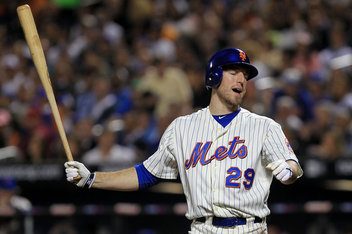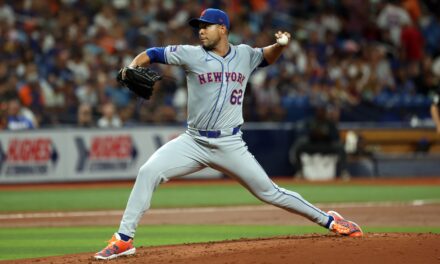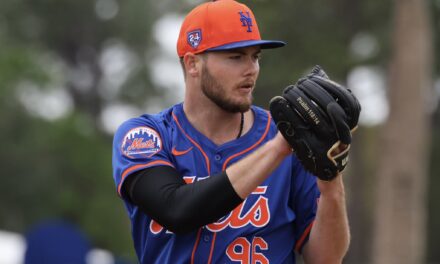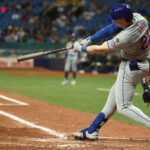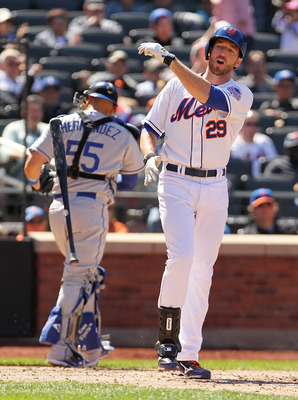 It always is interesting how people automatically call a hitter that hits homers, strikes out a lot and has a low average “Dave Kingman.” Kong certainly had his issues, but regardless of what you think he still had a 16-year career in which he hit 442 homers. To say that Ike Davis is Kingman would be an insult since that would be an improvement over what he’s producing today. As a matter of fact, a caller to Evan Roberts and Joe Benigno on WFAN actually may have uncovered who Davis really is: a reincarnation of Mike Jacobs.
It always is interesting how people automatically call a hitter that hits homers, strikes out a lot and has a low average “Dave Kingman.” Kong certainly had his issues, but regardless of what you think he still had a 16-year career in which he hit 442 homers. To say that Ike Davis is Kingman would be an insult since that would be an improvement over what he’s producing today. As a matter of fact, a caller to Evan Roberts and Joe Benigno on WFAN actually may have uncovered who Davis really is: a reincarnation of Mike Jacobs.
A year ago Davis was coming off the valley fever scare and ankle injury. His .156/.212/.290 slash line could be intellectualized. Similar numbers (.149/.229/.248) this year are reason for concern. There are many players that are slow starters, but are the Mets’ doomed to Davis not showing up the first ten weeks of the season? Has reality set in that he might be a 4-A hitter with flawed mechanics at the plate?
Davis and Jacobs are not exactly apples to apples comparison. Ike was a highly touted first round pick in 2008. His struggles in Brooklyn during his rookie year in pro ball were well documented. Jacobs was a 38th round pick that nobody talked about when he had a breakout 2005 season in Binghamton. He was supposed to be an injury replacement at the big league level, but If not for Pedro Martinez‘s lobbying after a Sunday afternoon home run, we never would have been treated to Jacobs’ September to remember. It’s also possible that Carlos Delgado would never have been acquired that offseason.
As a full-time first baseman from 2006-2008, Mike Jacobs averaged 23 homers, 75 RBI and a .258 batting average. In his two full seasons of work (2010, 2012) Davis has produced 25 homers and 75 RBI with a similar average. Both produce about the same level of strikeouts, although Davis has the penchant to walk a bit more- although probably not enough for the organization’s liking. Both struggle against left handers. Defensively, there is no comparison. Even when he’s struggled Davis has gold glove potential. Jacobs was only plugged-in at first after failing behind the plate. Still, a first baseman needs to hit at an elite level to be considered valuable. If Jacobs is the best that Davis has to offer, then it’s probably time to question if the Mets have a cornerstone at first base for years to come. Should they package Davis if and when he heats up again? Will a trip to the minors help? Is Lucas Duda the answer? Can they afford to pay for a first baseman on the free agent market?
Many scouts have expressed concern over Davis’ mechanics at the plate. It’s complicated, awkward looking and appears difficult to replicate. The more “noise” a player has in the box the harder it will be to hit a baseball, an already difficult task. Can this be fixed? That is hard to predict, but Davis wouldn’t be the first hot-shot hitting prospect to fizzle at the big league level. At the very least a trip to Triple-A Las Vegas should be on the table.
The Mets got lucky when both Jose Reyes and David Wright developed best case scenarios upon their call-up a decade ago. Prospects are an inexact science and, to date, none of the current group of homegrown players has shown to be consistent everyday big leaguers, much less stars.
WFAN callers rarely provide for intelligent or even interesting commentary. Comedy is more how I would describe my experience. Ironically, a caller to the midday show just might have uncovered a hard reality: Ike Davis is no better than a former flash in the pan prospect. I doubt even a productive final four months of 2013 will net a player any close to Delgado’s capabilities. Remember, lightening doesn’t strike twice.

